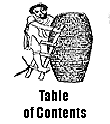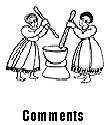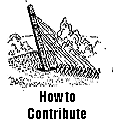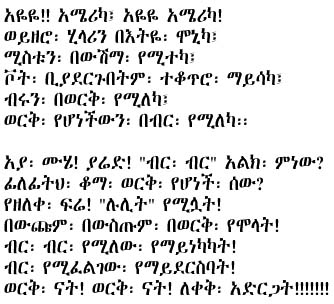
|
 From: Yared Subject: Sew Bela Derassi Dear Lullit, Once again, you set me an impossible standard to meet. Mnew yageré lijj, mn bibedilish new? The first thing I did after I read your entry was to dig ... dig ... DIG ... under many, many, recently packed boxes innocuously marked "BOOKS" to find my beloved Aleqa Kidane-Weld Kifle's "MeShafe Swasw We Gss, We Mezgebe Qalat Hadis", i.e. his G'Iz-Amharic dictionary. After flipping through the A - Bu - Gi - Da - ..formatted arrangement, I finally did pounce on page 561 upon the word "Lul", and a picture of one of those "Royal" orbs, and a translation which you did supply. Ergo, I stand corrected - nay, edified. Lullit, I wanted to say "ouch", "besme-ab", "weyne lju!" after your unabashedly, in-your-facely, na-yiwaTaln-ly word to my friend. Poor he, he never thought he would one day be used to represent a hated caricature. In his defense, I will say that whatever I would have written AT THAT TIME may not relate to HIS experiences. A wimpy defense? You betcha - because I believe fundamentally in what you so eloquently and "zerrrrafffff!!!"-ly said. I am a voice - if the ears find me tinny, too nagging, or stuporously mellow, then so be it. It reminds me of this scene from the movie version of "The Color Purple", where Whoopi Goldberg tells her husband Danny Glover that she is about to leave him. He laughs, and proceeds to tell her, "You'll be back!! Where will you go? You're black, ugly and stupid - who would want you?" Whoopi replies, "I may be black, stupid, and ugly. But thank God almighty, I'M HERE!!" ... The images you drew for me are just indescribable. The story of the young man who sliced off his tongue, (where did you get that story - and it is a shame you have not written it before, it's a must, must ...) was simply amazing. I cannot get away from the potent symbol of how, in such a cataclysmic moment, he unconsciously equated his writing to his "Lsan". His andebet. However, I get the sense that you believe the young man's tongue is growing back, encouraged by a symphony of washints whispering their encouragement from the four corners of the earth. Or better yet, you draw an image of these washints that are no meek "ayzoh berta"s, but mighty breaths of indignation, lyrically cast, tearing down the walls of a bloody Jericho in a worldwide crescendo of Ethiopian voices, epi-centered in the dark and dingy playhouses of Addis. Hah. Do I love words? You know, in my very first entry, I said I wanted to break down literature into its most basic element, its foot soldier called a WORD. (I took that off - so don't go back looking for it) I love words. I love to deconstruct them, conjugate them, say them, hear them, look up their definitions (or better yet - create one of my own). I am amazed by them. I have this theory that a word is nothing less than a piece of the universe. If one did not know the word "yiluNta", would one know such a thing existed? Which is why I think it is such a tragic, tragic thing that languages die out. As we become an English planet, I worry that we will be losing every little distinct nuance of what it means to be human organically programmed in every language's vocabulary and grammar. Yes, even grammar. Take for instance the standard definition of a semitic language, i.e. a basic three-consonant root that gets its meaning from the type and position of vowels AMONG the root consonants. Compare that to, say, a romance language like French or Italian etc, where variation is by means of addition of prefixes and suffixes. Now, ask yourself, is life a Semitic word, or a romantic word? Does life get meaning and flavor in the nooks and crannies within and among the basic root "word", or is life more a question of add and subtract? Example: "hasab" can be translated as "thought", but "they thought of (for) each other" can never be as neatly put as the single word - "tesasebu". Is there a standard unchanging core to your life, to which you add, or do you remove some feature (the modular life - as engineers might say it), or are you forever influenced, changed, mutated, by the subtle flavors that tend to work themselves into every corner and shelf of your life? Is your life Semitic, or is it Germanic? (No, a mirror is not going to save you on this one.) I remember a poet once talk about what Helen Keller said to her. The deaf, blind, mute girl did not, could not make head or tail of the world. In fact, she says, her universe was this black, unformed, cacophony of sensory inputs. Without a cop to label an experience she got, she was lost. She described her very first association of a symbol to the real thing as an earthshaking, profound experience that forever banished the darkness of her existence. You asked me to look up "Television" in the Science and Technology Dictionary. I did, and was unfortunately disappointed with its translation ... television. Now, I know what has happened. The translators have basically accepted that word as being part of the standard Amharic vocabulary. For someone who spends way too much time deconstructing, and deconjugating words, it is a shame. But, for someone who just a few sentences ago was lamenting our loss through global Englishization, it is more than that. Every time I write something in English, I am left with a nagging guilty feeling that perhaps I am doing my share in the loss of our own experiences. But then, I pick up a book like Haile Melekot Mewa'il's "Gungun", and I rest assured that powerful Amharic word wizardry is very much alive and well. Honestly speaking, your gursha requires a diggis in response. Unfortunately, planning the diggis will have to fight for "psychic real estate" with whether or not I am going to catch my plane today, go to the bank, drop stuff off at the post office and other banalities of the harried American life. And so I have to defer to the next one. I must say that your enqoqilish was not immediately obvious to me. Perhaps my enqoqilish gears have rusted. As to mine, I have to confess that it was no enqoqilish, but a question posed in a gTm format. I was half tempted to not say anything about it, and see if you can perhaps spontaneously create a riddle out of a spontaneously created poem, but I think I would much rather leave you with this one. It is a qné, I am sure you can solve it. (See? Now you actually get a riddle ...)
Yared To: Yared From: LullitSubject: Is short Sweet? Dear Yared, As promised, here is the short and sweet one. I want you to know, though, that I am exercising the maximum of self-restraint in not responding at length to your thought-provoking writing. Suffice to say that I am now not only searching desperately for your recommended reading book, "Gungun", but also trying to figure out whether my life is in fact Semitic or Germanic. I think I’ll get back to you on all that in my last entry. In the meantime, your question has me mefetshing and meftating every nook and cranny of the language of my life. I am busy fingering the fabric of my very existence with thumb and forefinger, feeling for basic root words, prefixes and suffixes, annexes and also using a stethoscope to listen out for the three consonants and the sound of vowels positioned among them. Igzer yiyilih abo! Homework new yeseteheN. Sima, yene weindim, Semitic or Germanic, can't it be both?
Demo, how boring that television is only translated as...TELEVISIOn, in your science and technology dictionary! I guess this explains why Alemayehu Eshete's last CD included that funky 70's tune with the lyrics "Be Hilmé New Be-Iwné, Weiyss Be Television ... " Like him, I am also beginning to wonder if meeting you and reading your writings is be hilmé new be-iwné or what! You say so much, with such depth with so few words, Ato Yared! Like Helen Keller, some of your writings, and the huge concepts that you cleverly manage to present in your short notes make me feel like the deaf dumb and blind who could not make head or tail of the world. Without a cop to label my experience of communicating with you in these Life Diaries, I too am lost. Still, since you have written me the explanation of your excellent giTim, (which I mistakenly thought was a riddle), I must tell you that the first association of a the symbolism in your poetry to the "real thing" was an earthshaking, profound experience that forever banished the darkness of my ignorance. Thanks. I will now store your giTim alongside my highly ranked giTim of Kassa Tessema's "Muzikaye Neshi", which is where I believe it rightly belongs. Arif new! I hope that in writing your last response, the verbal diggis that you wish to plan for me wins the fight for "psychic real estate." How many Amharic words are there for victory? HA! In the meantime, I accept your haiku of praise to me be nitSoo libona in the belief that the word birr means BI'IR and is not suggesting that I am a golden Oreo with only a silver interior. Bi-IR. Bi-Ir. It is as you know a word on the endangered species list of words. (This confirms our shared fears that languages do in fact disappear and it all starts with the extinction of words). Anyway, the word has unfortunately been replaced by scripto, skerbito, iskeereepto. I used the word Bi-Ir in Addis recently and on every occasion it drew second glances, raised eyebrows, invited a questioning quizzical expression and generally the word seemed to ring the rusty bells of many older minds. As for yilungta, it is of course a word that is quite dead and gone, as extinct as the puffin, I laughed at your choosing it for an example. Excellent example! OH BY THE WAY, because at first I DID NOT GET THE POSITIVE ASPECT OF YOUR HAIKU AND MISTAKENLY THOUGHT THAT YOUR WERE, IN qné, suggesting that all that glitters in me is not gold, and that I was in fact "BRRRRRR". I did the ultimate NO-NO and responded to the mistakenly perceived zelefa with a response of my own. Please be ready to laugh at what happens when there is complete failure to communicate. (Is my case a mirror image of our abesha Horn of Africa existence or what...pass the AK-47 Gash Dilnessa.) You said: Iswa Ko Bir Nat! My reply:
Ishi, Yared! See you in the next final LD and we’ll find out who has the last WORD, WORD WORD, and the last laugh. Tizita be posta likelihalew, melsoon be tolo eTebiQalehu. Lullit. |

|

|

|

|

|
| © Copyright SELEDA Ethiopia, January 2001. All Rights Reserved. |

